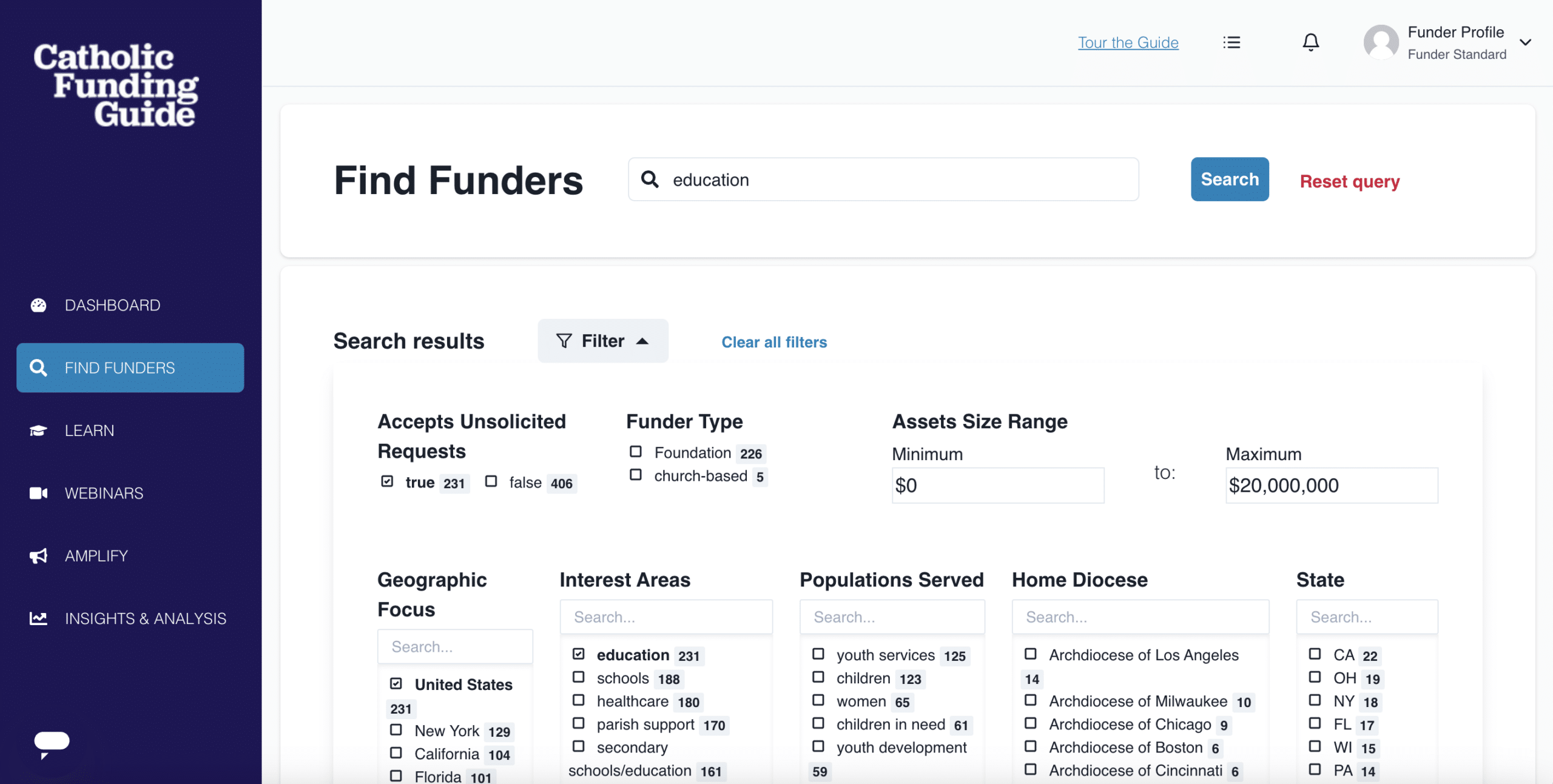Catholic Social Teaching within the Context of Philanthropy
How do we create a just society?
Justice is at the heart of the gospel message. The Christian church has engaged in social service since its inception, and thus, philanthropy is interwoven with the Church’s social mission. It is in this context that the Catholic Social Tradition is defined and can guide philanthropy to this day.
Stemming from Jesus’ calling to serve the poor, this longstanding tradition in the Church encompasses seven principles that uphold a spirit of service and stewardship:
1. Dignity of the Human Person
Catholic Social Teaching recognizes that each human person has a unique dignity, as each individual is equally created in the image and likeness of God.
Focus on supporting causes that uphold the value of human life from conception to natural death. It could be as simple as hosting a circle-of-life seminar, like the Catholic Foundation in Texas did. You could support pregnancy centers or advocate for causes that support just living conditions for all people.
2. Family & Community
This principle is based on the teaching that people are not only sacred, but also social. We are made for community. Marriage and the family are the central social institutions that shape society, and should be supported. All aspects of society (including economics, politics, and laws) have an impact on human dignity and our ability to grow in community.
Support causes that strengthen families and order communities toward the common good and wellbeing of all. For example, Catholic Charities’ pregnancy centers go beyond the basics of providing baby products. They also offer adoption services, parenting classes, housing solutions, and more.
3. Rights & Responsibilities
The Church teaches that human rights must be protected in order to uphold the dignity of the human person and build healthy communities. This includes protecting vulnerable populations such as children, immigrants, or the elderly.
Support efforts that address poverty, racism, and the rights of vulnerable populations, perhaps by adopting safeguarding policies. The Riley family felt strongly about this principle, so they started their own foundation to address homelessness in Philadelphia and to leave a legacy of giving for their children to follow.
4. Option for the Poor
The Church recognizes the disparity between the wealthy and the poor in society, and urges us to love the poor as Jesus did.
Support efforts to provide basic necessities to the poor, but also systems and policy changes and improvements that protect the dignity of the poor and vulnerable, promoting a more just society. You could finesse your mission statement (whether you have a foundation or a donor advised fund) to reflect this principle, similar to how the Specialty Family Foundation has such a clear and direct focus on alleviating poverty through their work with Catholic schools.
5. Dignity of Work
The Church teaches that work is not just a way to make a living. Through work, we are invited to participate in God’s creation. The rights of workers must be protected and upheld in society. These include the rights to productive work, decent and fair wages, the organization and joining of unions, private property, and economic initiative.
You can support this principle in a variety of ways. If you have employees, rewrite your HR policy to exemplify this principle in a more focused way. Focus your work supporting programs that help the unemployed or organizations that advocate for workers’ rights or provide job training. Support organizations that engage in fair labor practices.
6. Solidarity
Based on the truth that we are all one human family, the Church calls us to seek justice and peace in loving our neighbor.
Support organizations that foster community collaboration, interfaith and intercultural understanding, and those that promote social and environmental responsibility. You could also support or spearhead efforts like these community gardens established by Catholic Charities to help feed refugees, those experiencing homelessness, and other vulnerable groups.
7. Care for Creation
The Church calls us to care for creation as responsible and respectful stewards of the world God so lovingly created.
Support efforts that protect natural resources and wildlife, promote renewable energy, and reduce environmental degradation. The Catholic Community Foundation of Minnesota hosted a social forum to share and discuss the principles of Laudato Si’; the videos may inspire you if you choose to expand your giving practices within this principle.
Learn more about the principles of Catholic Social Teaching from the USCCB.
These seven principles or themes are inherently Biblical:
Its roots are in the Hebrew prophets who announced God’s special love for the poor and called God’s people to a covenant of love and justice. It is a teaching founded on the life and words of Jesus Christ, who came “to bring glad tidings to the poor . . . liberty to captives . . . recovery of sight to the blind” (Lk 4:18-19), and who identified himself with “the least of these,” the hungry and the stranger (cf. Mt 25:45). (Source: the USCCB)
Embracing these principles in your funding practices gives you the opportunity to orient your work toward lasting impact related to your mission, while also inviting you to live out key tenants of the faith personally and professionally.
The Benefits of Embracing Catholic Social Teaching
Catholic social teaching is a living, enduring, international tradition both in the praxis and within intellectual and scholarly discourse. It is meant to challenge and inspire the faithful with the Gospel values, specifically surrounding topics such as access to resources, the preferential option for the poor, and what it means to truly live in community. Assessing your philanthropic work through this lens of Catholic social teaching allows you to apply these principles to your work in a more thoughtful way.
Additionally, Catholic Social Teaching can help you…
- Frame your mission and values using common language that resonates both within the Church and outside of the Church.
- Ground your work.
- Discern your giving principles and processes.
- Add dimension to existing conversations in the philanthropic world (for example, within the realm of trust-based philanthropy).
- Add context to critical questions about justice in philanthropy.
- Open dialogue with peers who share your values.
When you find yourself wondering, as many funders do, “Is my work making a true and lasting impact?” you can examine the principles of Catholic social teaching in relation to your work and find clarity and encouragement.
FADICA’s 9-Week Certificate: Put Catholic Social Teaching into Action
FADICA (Foundations and Donors Interested in Catholic Activities) offers a 9-week certificate program, “Catholic Social Tradition and Philanthropy,” which is designed to help root your philanthropy practices in the justice-minded principles of Catholic social tradition.
About the Certificate
FADICA’s certificate presents the opportunity to learn about Catholic social teaching themes in a structured, supportive environment:
- The certificate program includes weekly lectures, supplemental resources, time for written reflection, and a chance for open discussion among participants.
- You’ll be paired with an accountability/discussion partner and have a chance to participate in small group discussions.
- The program is designed for busy professionals. You can work independently but also engage with a community of practice.
- Course material is geared toward themes of particular interest to funders, including care for the common home, the common good, and subsidiarity.
Getting Started: Catholic Social Teaching Themes in Laudato Si’
Putting Catholic social teaching into practice in philanthropy can start with Laudato Si’, a well-known encyclical by Pope Francis that focuses on the transformation of hearts and minds toward the greater love of God, each other, and creation. The letter calls for an ecological conversion. Many funders have referenced Laudato Si’ as a starting point for assessing and adjusting their giving practices.
If you want to implement some of the key points of Laudato Si’, start by reflecting on these questions:
- How do my funding practices encourage others to have an ecological conversion?
- Do I personally feel called to an ecological conversion? In what ways?
- Do I have a sense of responsibility and urgency to care for creation?
- Do the organizations I fund have practices in place that foster care for creation and care for others?
The answers should give you a sense of direction for your next steps.
After reflection, connect with peers who share the same values and are also working to answer the call of Laudato Si’. Joining FADICA’s 9-week certificate program offers a great opportunity to do this; so does the FADICA membership program for philanthropists.
You can also reach out to those in your network and your community who are making ecological conversion efforts. Share best practices and encouragement as you implement these principles together.
Start Your Catholic Social Teaching Journey Today
Every journey starts with one step. Here are a few steps you can take today to begin your journey to embrace the Catholic social tradition in your funding work.
- Set aside some time to learn and reflect on the principles of the Catholic social tradition.
- Come into engagement and community by dialoguing with peers about the topic.
- Challenge yourself to think about the justice framework for your work and inspire your own vocation.
- Learn more about FADICA’s 9-week certificate.
To learn more about FADICA’s Catholic Social Tradition and Philanthropy Certificate, contact Margaret Kowalsky, Director of Program and Impact, at mkowalsky@fadica.org.


